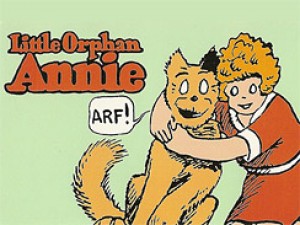 Central to Dale’s divine deception argument against Social Trinitarianism (ST) is the following analogy. Little orphan Annie is one day adopted by a man named Fred who claims to be her father. Fred lovingly raises Annie over the years, but for unknown reasons will not see her in person. But, at long last, Fred finally does meet her. Much to her surprise, however, Annie meets not one man but three men—Don, Jon, and Ron—who explain the elaborate effort to appear as one, “Fred.” Dale thinks their act of deception is morally blameworthy. Mutatis mutandis, the Father, Son and Spirit would be guilty for similarly deceiving the ancients, leading them to believe God is one person and not three. Dale outlines his argument as follows:
Central to Dale’s divine deception argument against Social Trinitarianism (ST) is the following analogy. Little orphan Annie is one day adopted by a man named Fred who claims to be her father. Fred lovingly raises Annie over the years, but for unknown reasons will not see her in person. But, at long last, Fred finally does meet her. Much to her surprise, however, Annie meets not one man but three men—Don, Jon, and Ron—who explain the elaborate effort to appear as one, “Fred.” Dale thinks their act of deception is morally blameworthy. Mutatis mutandis, the Father, Son and Spirit would be guilty for similarly deceiving the ancients, leading them to believe God is one person and not three. Dale outlines his argument as follows:
- Don, Jon, and Ron acted wrongly.
- If ST is true, the Father, Son, and Holy Spirit acted like Don, Jon, and Ron.
- Therefore, if ST is true, the Father, Son, and Holy Spirit acted wrongly.
- But it is false that any member of the Trinity has acted wrongly.
- Therefore, ST is false.
In a previous post, I sketched a way of attacking premise (2) that I think decisively undermines the argument. Lest we have too little of a good thing, I now what to mention a way of undermining premise (1). What does Dale say on behalf of (1)? His defense is short:
Though not all deception is morally wrong, it seems that Don, Jon, and Ron have no morally sufficient reason to deceive Annie. Though only eight years only when they initiated contact, she could have been introduced to one or more of the three instead of the fictional ‘Fred’, and she could even have been told that she had three dads. It is part of our story that the men weren’t compelled to adopt the charade to protect her, to achieve some wonderful aim that required it, or because each by himself lacked the resources to properly parent her. And it seems clear that the arrangement was in some way disrespectful and inappropriate. Though on the whole Annie greatly benefited from the arrangement, she would have benefited at least as well from a straightforward relationship with one or more of the three, and the fact that they were great benefactors to her doesn’t seem to have given Don, Jon, and Ron the right to deceive her regarding such an important matter… (“Divine Deception,” p. 272).
 Significantly, Dale’s defense relies on a “noseeum” inference common in evidential arguments from evil. William Rowe famously argued that some evils are probably gratuitous on the grounds that there seem to be no morally sufficient reasons for permitting them. And if we see no such reasons, probably, there be no such reasons. Similarly, Dale: because it seems that Don, Jon, and Ron have no morally sufficient reason to deceive Annie, probably, there be no such reasons. So, probably, Don, Jon, and Ron acted wrongly.
Significantly, Dale’s defense relies on a “noseeum” inference common in evidential arguments from evil. William Rowe famously argued that some evils are probably gratuitous on the grounds that there seem to be no morally sufficient reasons for permitting them. And if we see no such reasons, probably, there be no such reasons. Similarly, Dale: because it seems that Don, Jon, and Ron have no morally sufficient reason to deceive Annie, probably, there be no such reasons. So, probably, Don, Jon, and Ron acted wrongly.
 Stephen Wykstra, with a bit of philosophical Tai Chi, pointed out to Rowe that noseeum inferences are good only in cases where a certain subjunctive condition is met. For instance, if I see no elephant in the cage, it’s perfectly proper for me to infer that, probably, there be no elephant in the cage. The reason is because if there were an elephant in the cage, probably, I would see it. Contrarily, if I see no germs on a needle, I can’t justifiably infer that, probably, there be no germs on the needle because, clearly, even if there were germs on the needle, I shouldn’t expect to see them anyway.
Stephen Wykstra, with a bit of philosophical Tai Chi, pointed out to Rowe that noseeum inferences are good only in cases where a certain subjunctive condition is met. For instance, if I see no elephant in the cage, it’s perfectly proper for me to infer that, probably, there be no elephant in the cage. The reason is because if there were an elephant in the cage, probably, I would see it. Contrarily, if I see no germs on a needle, I can’t justifiably infer that, probably, there be no germs on the needle because, clearly, even if there were germs on the needle, I shouldn’t expect to see them anyway.
Rowe makes a bad noseeum inference, for if God did have morally sufficient reasons for permitting seemingly gratuitous evils, we shouldn’t expect to be privy to them anyway. It is much more likely that if God had such reasons they would be incomprehensibly complex and so epistemically inaccessible to our little minds. Just as a toddler cannot understand why mommy has brought her to this strange, sterile room so a scary-looking man in a white coat can poke her with a needle, we should not expect to be able to understand the reasons God has for permitting the evils that befall us.
Dale’s noseeum inference is no better than Rowe’s. Couldn’t Don, Jon, and Ron have had morally sufficient reasons for deceiving Annie? For example, suppose Don, Jon, and Ron were in fact conjoined triplets who very much acted as one. Rather than confusing poor, already fragile young Annie by provoking identity-crisis questions (“Wait, do I have one dad or three? Do I come from a polygamous family? Who is my daddy, and what does he do?”), Don & co. might simply—and, seemingly justifiably—have waited to reveal to Annie the truth of the matter until she is in a position to better understand it. Don & co. could then be seen as having wisely and lovingly avoided burdening Annie with complications better wrestled with at a more mature age.
(Caveat: notice that in the middle of the passage quoted above, Dale slips in an attempt to forestall this kid of response: “It is part of our story that the men weren’t compelled to adopt the charade to protect her, to achieve some wonderful aim that required it, or because each by himself lacked the resources to properly parent her” [italics mine]. This slippery statement effectively builds into the story that the “charade” is gratuitous; i.e., that Don & co. do not have the kind of morally sufficient reasons for deceiving Annie that Social Trinitarians think God might have for deceiving the ancients. The statement therefore begs the question against Social Trinitarians, for it is exactly not how he sees things.)
Similarly, even if it seems like the Father, Son, and Spirit had no morally sufficient reasons to deceive the ancients, we cannot justifiably infer that, probably, there be no such reasons, for we should not expect to be any more privy to those reasons than the reasons for why God permits seemingly gratuitous evils. It is folly to suppose what omniscience sees as clearly optimal providential ordering would be just as clear to us. Thus, in the same way theists can offer theodicies in response to the problem if evil—speculations on what morally sufficient reasons God might have for permitting evils—the Social Trinitarian can offer theodicies in response to divine deception—speculations on what morally sufficient reasons God might have for revealing himself ‘at many times and in various ways’ throughout history.
If I am right that both Rowe’s and Dale’s arguments employ basically the same noseeum inference, this leaves Dale with an awkward dilemma. If he agrees with Wykstra that Rowe’s argument against God’s existence employs a bad noseeum inference, Dale should agree with me that his argument against ST employs a bad noseeum inference. On the other hand, if Dale thinks his argument against ST employs a good noseeum inference, he should also think Rowe’s argument against God’s existence employs a good noseeum inference. Therefore, either Dale should give up his divine deception argument against ST or become an atheist.
